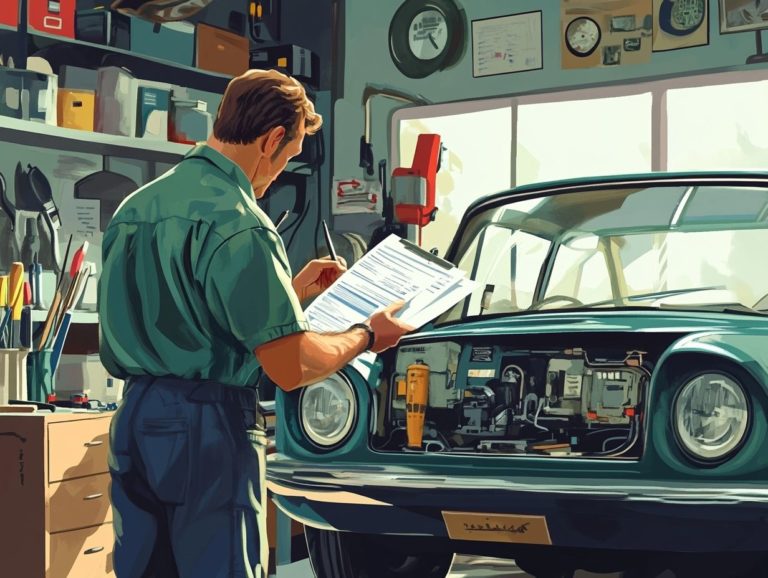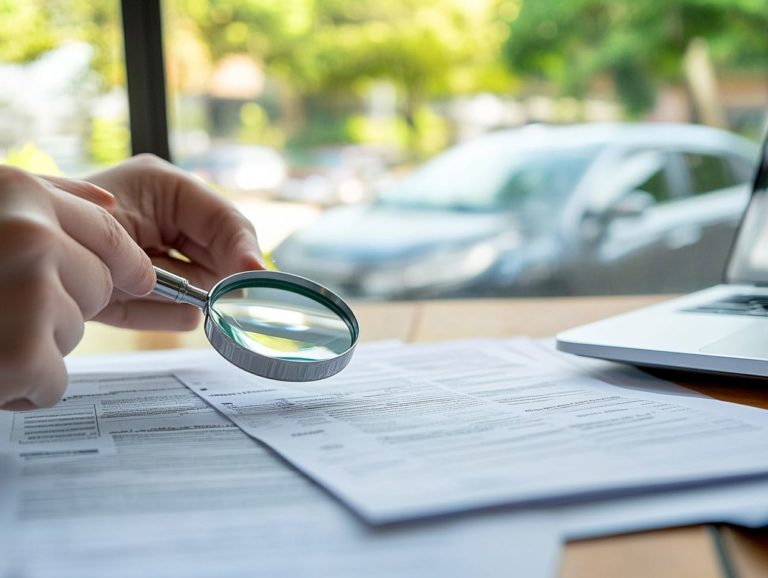How Mileage Affects Used Car Value
When you’re navigating the world of buying or selling a used car, mileage becomes a pivotal factor in assessing its value.
Understanding how mileage influences price, along with other essential elements, empowers you to make well-informed decisions, whether you’re a buyer or a seller.
This article delves into the significance of mileage, examines the correlation between mileage and price, and presents practical strategies to enhance the value of high-mileage vehicles.
Whether you’re on the hunt for a used car or contemplating selling one, this guide is tailored to meet your needs.
Contents
Key Takeaways:

- Mileage is the total number of miles a car has been driven and is an important factor in determining the value of a used car.
- High mileage can significantly lower a car’s value, but factors such as condition and maintenance also play crucial roles.
- Strategies like proper maintenance and showcasing features can help increase the resale value of high-mileage cars. Consider these factors when buying or selling a vehicle.
Understanding Mileage and Its Impact on Used Car Value
Understanding mileage is crucial when assessing a car’s value, particularly for used vehicles. Mileage, the total distance a vehicle has traveled, is a key indicator of its overall condition.
As a discerning buyer, consider mileage data alongside the maintenance history to make wise financial decisions. Average mileage and depreciation rates significantly sway the perceived value of older cars.
While high mileage might raise eyebrows, remember that a vehicle s overall quality can still shine through, even after many miles on the road.
What is Mileage and Why is it Important?
Mileage represents the total distance a vehicle has traveled, typically measured in miles or kilometers, and it plays a crucial role in evaluating a used car s condition and value.
Understanding mileage is essential for potential buyers, as it directly relates to a vehicle’s wear and tear. Generally, lower mileage suggests less use, which often means less maintenance is needed, positively influencing resale value.
On average, drivers cover about 12,000 to 15,000 miles each year a benchmark that helps you determine if a specific vehicle aligns with typical usage patterns.
Mileage also impacts fuel efficiency. For instance, a petrol car may start to lose efficiency once it reaches high mileage due to engine wear, while diesel vehicles often maintain better fuel economy over longer lifespans. Understanding how mileage affects these factors empowers you to make informed decisions.
Factors That Affect Used Car Value
Several factors greatly influence the value of used cars, including depreciation rates, overall vehicle condition, and service history. Each of these elements plays a pivotal role in your car choices.
Understanding their impact can lead you to make more informed decisions in the used car market.
Other Key Considerations

In addition to mileage and depreciation rates, take service records and the overall condition of the vehicle into serious consideration when evaluating a used car’s value.
These documents provide a detailed history of maintenance and repairs, offering crucial insights into how well the vehicle has been cared for over the years. A thorough service record often indicates that previous owners prioritized the car s upkeep, which can signal reliability.
Combine this information with an assessment of the car’s exterior and interior, and you’ll gain a clearer picture of the vehicle s overall health. Lower mileage, along with a solid maintenance history, typically suggests fewer problems down the line, empowering you to make choices that align with your budget and expectations.
How Mileage Affects Used Car Value
Mileage plays an important role in determining the price of used cars, as both low and high mileage directly impact the vehicle’s condition. This, in turn, shapes the financial decisions you ll make as a potential buyer.
Understanding this relationship is essential for making informed choices in the used car market.
The Relationship between Mileage and Price
The relationship between mileage and price is a crucial element in the used car market, where higher mileage typically results in lower prices due to faster loss in value.
Understanding this correlation is important whether you’re buying or selling, as it can significantly impact your financial decisions. For example, a vehicle with over 100,000 miles might see its value plummet by as much as 30% compared to a comparable model with only 50,000 miles. This depreciation not only signifies the vehicle’s wear and tear but also hints at potential repair needs in the future.
As a buyer, you ll often weigh these factors when considering your options, aiming to find that sweet spot between initial cost and anticipated longevity. By being informed about the nuances of mileage, you can empower yourself to make smarter purchasing decisions, ultimately leading to better long-term financial outcomes.
Maximizing the Value of a High Mileage Used Car
Maximize the value of your high-mileage used car by focusing on proper care and maintenance history. Being transparent about the vehicle’s condition when presenting it to potential buyers will also work in your favor, ensuring you attract the right audience and command a higher price.
Strategies for Increasing Resale Value

To boost the resale value of high-mileage used cars, prioritize maintaining the vehicle’s condition and ensure detailed maintenance records are readily available.
Regularly performing essential maintenance tasks think oil changes, tire rotations, and brake inspections can safeguard the longevity and reliability of the vehicle. Documentation is key; having a detailed service history for potential buyers boosts their confidence in the car’s upkeep over the years.
Addressing minor repairs, like replacing worn-out wiper blades or fixing small dents, can change a buyer s perception, preventing them from thinking the vehicle has been neglected and enhancing its overall appeal. By implementing these strategies, you not only retain value but also attract buyers who appreciate transparency and reliability in their potential purchase.
Buying and Selling High Mileage Used Cars
Navigating the landscape of buying and selling high-mileage used cars necessitates a deep understanding of vehicle conditions, as well as the financial implications shaped by the maintenance history. Each decision you make hinges on this knowledge, ensuring that you not only find a reliable vehicle but also make sound financial choices.
Tips for Buyers and Sellers
As a buyer or seller of high-mileage used cars, it s essential to follow practical tips to ensure a satisfactory transaction. Focus on the importance of service history and engage with trusted dealers.
Navigating the complexities of purchasing or selling a vehicle requires you to prioritize thorough inspections before finalizing any deals. Understanding the car’s service history not only reveals its past performance but also helps identify any recurring issues that may impact future reliability.
Engaging with reputable dealers can provide you with added assurance, as they often offer warranties or guarantees to protect your interests. If you re in the market to buy, take the time to test drive the vehicle. As a seller, be ready to provide detailed records and respond openly to inquiries, fostering trust throughout the entire process.
Frequently Asked Questions
How does mileage affect the value of a used car?

Mileage is a key factor in a used car’s value. Typically, higher mileage means a lower value.
When Does Mileage Affect a Used Car’s Value?
The mileage threshold for a significant drop in value varies by make and model. Typically, once a car surpasses 100,000 miles, its value can decrease by up to 20%.
Does Driving Style Matter?
Yes, the type of driving influences a car’s value. Highway miles are generally considered gentler on vehicles than city miles.
Can High Mileage Still Mean Good Value?
Absolutely! A well-maintained car with high mileage can retain its value. Regular upkeep can counteract the effects of mileage.
How Does Mileage Impact New vs. Old Cars?
Mileage significantly affects older cars more than newer ones. New cars often have more durable parts that handle higher mileage better.
How to Assess a Used Car’s Value?
Many online tools can help estimate a used car’s value based on mileage. Consider the make, model, and condition, along with features and upgrades.
Comparing mileage with similar cars on the market can also provide valuable insights.






